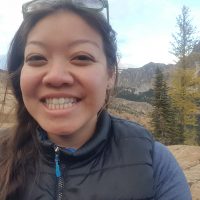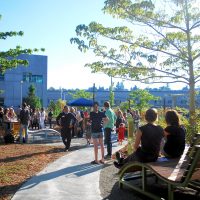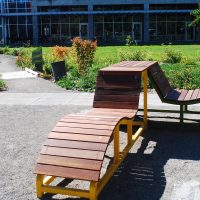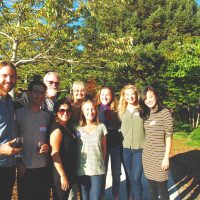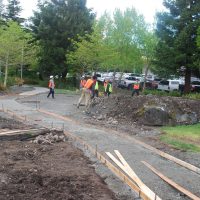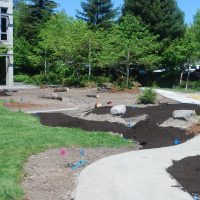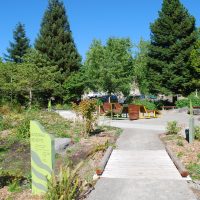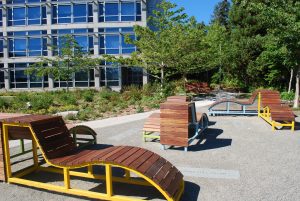The Program on the Environment Alumni Council provides Environmental Studies alumni resources for networking and professional development, and opportunities for community building.
This year, the council has re-envisioned its purpose and onboarded new members from recent cohorts to join in efforts to connect, celebrate and support alumni and build lasting relationships. The vision of the council is to foster connections across academic and professional realms that provide the Environmental Studies community with sustained opportunities for career advancement and personal achievement.
Learn more about the alumni council and get to know our council members, below!
Alumni Council
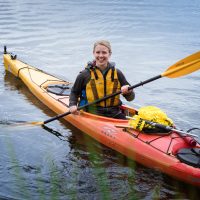 Kathryn Davis
Kathryn Davis
Class of 2011
Stewardship Manager, Puget Soundkeeper
In my role as Stewardship Manager at Puget Soundkeeper, I have the opportunity to work with groups throughout the Puget Sound region to protect clean water and share information related to water quality issues. My day can be spent doing anything from speaking in a classroom, to kayaking one of our beautiful waterways, to wading through an urban creek counting returning fish and grabbing water samples. I love it!
My undergraduate experience at the Program on the Environment (POE) solidified my commitment to promote the connections between a healthy world and healthy people. My favorite memory from POE is spending a week at Pack Forest learning about sustainable forestry and ecosystem recovery.
Along with the rest of the alumni council, I would like to help build a bridge between current students and the professional world and continue to connect the growing circle of POE alumni. Regardless of your chosen career pathway, there is room for you to share your perspective and stay involved with the POE community!
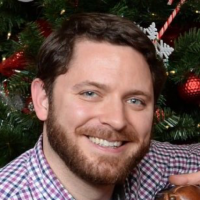 Blake Konrady
Blake Konrady
Class of 2005
Program Manager, PROVAIL
I currently work for a nonprofit organization called PROVAIL and manage a program in partnership with Microsoft called The Microsoft Autism Hiring Initiative. I help recruit, assess, train, retain, and coach individuals on the autism spectrum for jobs in the technology industry.
My favorite memory from POE is being able to put studies, data, publications and research from the spectrum of collegiate fields in support of Environmental Studies when discussing public policy and the reasons why protecting our natural world is so important. Meeting so many passionate professors and classmates helped cement my mentality of fighting for what’s right and to be supportive and helpful to all of those around me.
I hope to bring experience from being on the council from the last three years and look forward to how we can refresh the energy, enthusiasm and reach of our work.
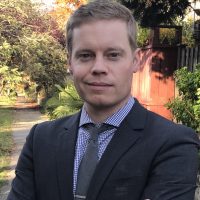 Sean Wood
Sean Wood
Class of 2010
Owner, Contourlines NW
I appreciate that POE allowed me to combine my financial educational background with a focus on sustainable business development quite seamlessly, letting me get the designer degree I was looking for: one that was custom-tailored to my goals and career aspirations.
I hope to plan and support events that get current students excited and engaged in the career-seeking process. I plan to support them by providing guidance toward setting and achieving their post-graduation, professional goals.
Stephanie Ung
Class of 2014
Naturalist, Seattle Parks & Recreation in the Citywide Environmental Education Unit
I build partnerships and co-develop environmental learning programs to support access to liberating and inspiring experiences being in nature can bring. I like to think critically about the programs we currently offer and how we can improve them! At the root of it all, I’m always thinking about systems and how environmental education is a little blip that can have a huge impact on it all.
My favorite memory from POE was co-founding SAGE (The Student Association for Green Environments) and being involved with community building among other students (shout out to Stephanie Aragon and Sarah Sanborn!). Biggest takeaway: everything is interrelated with everything else; relationships matter!
As part of the alumni council, I hope to bring a critical lens around diversity, equity, and inclusion in the environmental field, as the root causes of our planet’s destruction lie in corrupt systems (including those built for and supported by people). I hope to be a part of supporting the movers, shakers, and interrupters of POE!
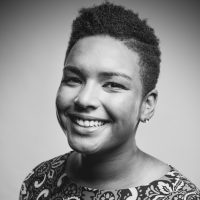 Adrienne Hampton
Adrienne Hampton
Class of 2015
Field Technician and Graduate Student, UW
I completed the Environmental Studies BA with a focus in marine conversation. Currently I am a field technician with the UW Biology Department, Mt. St. Helens Institute, and the U.S. Forest Service.
I seek to influence the nexus where science and policy intersect, to push science into policy. I am also an MPA Candidate within the Evans School of Public Policy and Governance at UW.
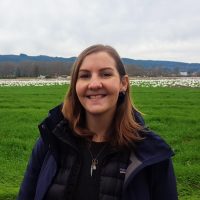 Alexandra Bradley
Alexandra Bradley
Class of 2016
Environmental Coordinator, Patagonia Ballard
In my role at Patagonia Workwear Flagship store in Ballard I direct the grant-giving processes and develop relationships with non-profits, inviting them to events with the goal of celebrating their work, inspiring advocacy and facilitating engagement in the broader community. I also keep tabs on sustainability metrics in our store and provide staff and partners with a growing list of activism opportunities.
My favorite memories from POE are from experiential learning opportunities that were made possible by lots of coordinated work and relationships. I still think about what I learned visiting 7 dairy farms in one day with Stevan Harrell, a 9-day backpacking trip in Olympics with Tim Billo, 7 days in Yellowstone National Park with Dr. John Marzluff and a weekend with Elizabeth Wheat on her farm on Whidbey Island. I feel lucky to have had so many unique experiences as part of my academic education.
I hope to contribute to the alumni council by collaborating with the council members to plan events and intentionally engage students and alumni, encourage a stronger sense of community, participate in on and off-campus events, and learn all I can from others around me!
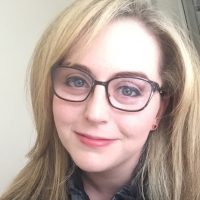 Josephine Strauss
Josephine Strauss
Class of 2017
Legal Assistant, King County Prosecutor’s Office
I work on various projects throughout the administration section at the King County Prosecutor’s Office; this often involves working with policies and assisting in research and data analysis. I have my eyes set on law school in the near future.
A favorite memory from my time at POE was my ENVIR 280 (Natural History of the Puget Sound) class field trip to Olympic National Park! I loved it and it was definitely one of the most exciting field trips of my undergrad experience.
As a member of the alumni council, I hope to bring fun, innovative ideas that help bridge the gap between current students and alumni, and existing alumni and their connection to the program after graduation. I am also hoping to learn more about how POE alums are spending their time after they’ve left UW.
